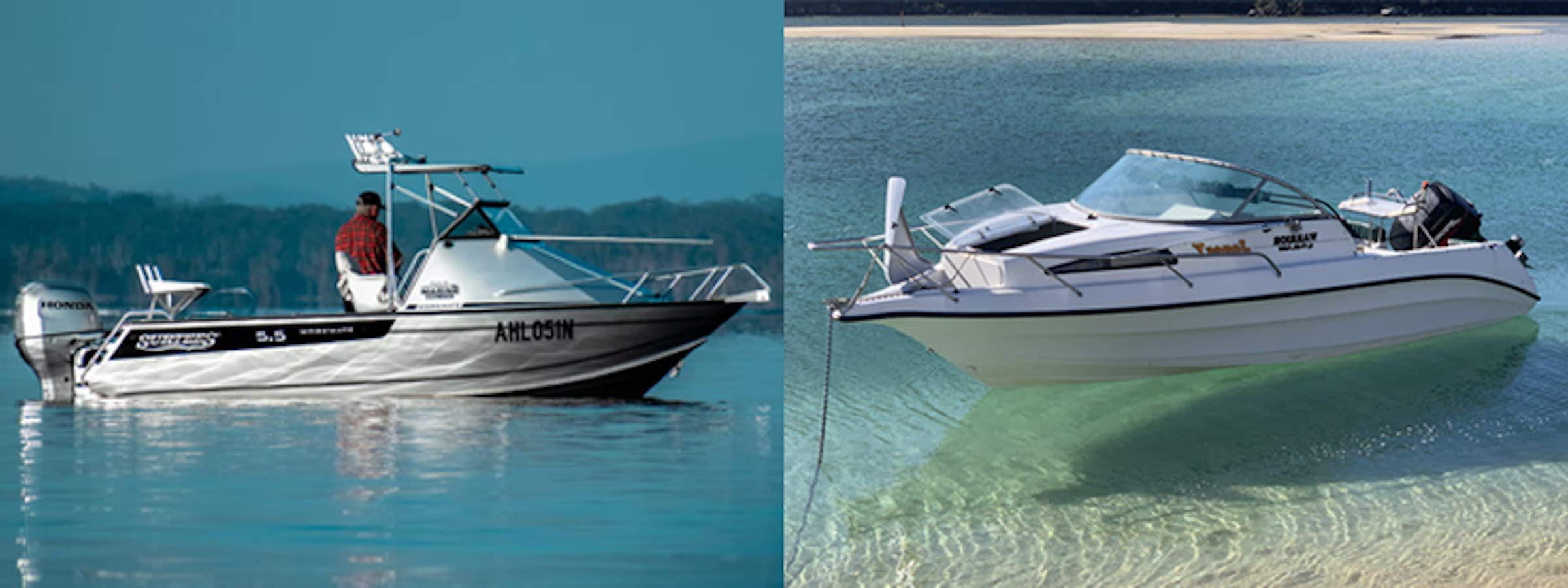
Arguing the toss over fibreglass and aluminium boats
It may not be as controversial as the old Holden versus Ford debate, but there are plenty happy to argue the merits of fibreglass versus aluminium boats and vice versa, of course!
Perhaps you have an unbudging opinion on which is best, but for many, choosing the right boat is an overwhelming process. But never fear, professional opinions are at hand.
Haines Hunter, for example, will have us believe a fiberglass (or composite) boat (such as a Haines Hunter) has many advantages over its aluminium (or alloy) counterparts.
Truth be told, aluminium and fiberglass boats each have their own advantages and disadvantages and which one is best for your own personal needs depends on your own priorities. We’ve gone to the Discover Boating website for some solid insight to start the discussion.
Team fibreglass
- Fiberglass boats tend to weigh more, so they generally have better seakeeping abilities and more stability than aluminium boats
- Due to their greater weight, fiberglass boats don’t get easily buffeted by the wind, so they tend to drift more slowly and more predictably (a trait important to anglers, in particular)
- It’s easier to manufacture fiberglass into complex designs, so fiberglass boats can employ much more complex hull shapes, with things like bow flare, steps, and variable-degree deadrise (where the aggressiveness of the V-shape changes in different portions of the hull)
- The ability to include complex shapes also means that fiberglass boats can have accessories like livewells, tackle stations, seating modules, and fishboxes, integrated right into the main structure of the boat.
- Many people feel the crisp, clean look of fiberglass can’t be beaten.
Team aluminium
- Common production aluminium boats tend to be less expensive (sometimes significantly so) than their fiberglass counterparts
- Aluminium boats usually weigh substantially less than fiberglass boats of the same size, which means they require smaller powerplants to attain similar performance and thus have lower operating costs
- Due to their lower weight, aluminium boats are easier to launch and load at the boat ramp, easier to push on or off sandbars, and easier to trailer around with a small tow vehicle
- Aluminium boats often require less maintenance as there’s no need to wax a gel coat
- Aluminium dents - rather than cracking or breaking upon impact - so repair costs are usually lower if there’s an accident.
As an aside…you may have noticed that a few traits of each material show up as positives for both boats in opposite ways. That’s because, for example, an aluminium boat’s lighter weight delivers several advantages, but in some other ways a fiberglass boat’s additional heft gives it a leg up.
A blog on the Powerboat Training NZ site says when it comes to choices around boat composition, what may be one person’s pride may be another’s scorn. There is no right or wrong choice, just what works for you. Look at the advantages and disadvantages of each to help make your decision.
This blog does exactly that, with the advantages of aluminium including robustness and weight, and disadvantages encapsulating comfort, handling, cost, repair, corrosion, cold, and anti-fouling. The advantages of fibreglass meanwhile, are aesthetics, repairs, maintenance, with the disadvantages being, flaws, osmosis, wood rot. Check out this site for further explanation. The pros and cons are also discussed on the Boat Buy website and Boats.co.nz.
As expected, there’s no shortage of opinions. The Blue HQ website list seven key factors and then proceeds to look at which boat type tackles each of these best. The results are:
- Ride comfort - fibreglass
- Toughness - aluminium
- Price - aluminium
- Repairability - aluminium
- Customizability - aluminium
- Maintenance - aluminium
- Aesthetics - fibreglass.
But, of course, the fact that aluminium ticks more boxes in that article, doesn’t mean that’s the boat for you. The answer to which you chose is likely to be found in your specific boating scenario. As pointed out on the Discover Boating website, boaters who often ply the waters of boulder-strewn rivers would most likely opt for aluminium boats since hull damage could be a perpetual issue with a fibreglass boat. Same too for those who are time-poor as an aluminium boat comes with lower maintenance needs. Conversely, boaters who regularly cruise open, chopy bays often prefer fiberglass boats so they get a smoother ride cruising to and from the fishing grounds.
At the end of the day, there will always be boaties who will swear by either fibreglass or aluminium and they will probably never be swayed no matter how many good arguments are put forward to the contrary. Do the research and just buy what you deem is best for you!
Looking for the right cover on the water in New Zealand in 2022?
No matter what your plans are on the water in 2022, Mariner Insurance is here to support you. We have been offering Kiwis specialist marine insurance in New Zealand for over a decade with cover for all types of boats and watercraft. Just talk to us about what you’re doing on the water, and we can tailor one of our insurance policies to fit.